News

November 18, 2021
Could a tank of ice or hot water be a battery? Yes! If a battery is a device for storing energy, then storing hot or cold water to power a building’s heating or air-conditioning system is a different type of energy storage. Known as thermal energy storage, the technology has been around for a long time but has often been overlooked. Now scientists at Lawrence Berkeley National Laboratory...
Read more

November 17, 2021
Carbon dioxide (CO2), a product of burning fossil fuels and the most prevalent greenhouse gas, has the potential to be sustainably converted back into useful fuels. A promising route for turning CO2 emissions into a fuel feedstock is a process known as electrochemical reduction. But to be commercially viable, the process needs to be improved, to select for, or to yield, a higher amount of...
Read more
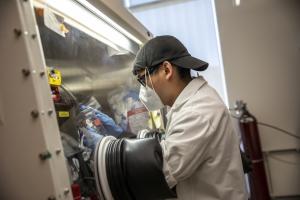
November 8, 2021
Berkeley Lab has been awarded more than $13 million for five research projects that will accelerate the development of advanced lithium batteries and smart, connected vehicles, making it easier to switch to electric vehicles. The awards were announced by the Department of Energy and are part of a total of $209 million in battery research projects selected by DOE’s Vehicle Technologies Office....
Read more

November 8, 2021
A team led by Wei Tong of the Applied Energy Materials Group in the Energy Storage and Distributed Resources Division is one of three Berkeley Lab winners of an R&D 100 Award for 2021. The team developed a unique layered-rocksalt intergrown cathode material for a new generation of lithium-ion batteries that offers higher capacity, faster charging time, superior cycling, thermal stability, and...
Read more
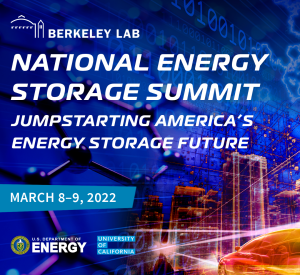
November 4, 2021
Exponential energy storage deployment is both expected and needed in the coming decades. To that end, the U.S. Department of Energy's Lawrence Berkeley National Laboratory (Berkeley Lab) is hosting a summit on March 8 and 9, 2022, to discuss harnessing science, technology, and policy to accelerate energy storage solutions for our nation. The virtual public summit will convene and connect national...
Read more

November 3, 2021
States are increasingly recognizing equity as a goal of utility regulation, going beyond traditionally stated objectives to ensure that electricity systems are reliable, safe, and fairly priced. But they are just beginning to grapple with how to achieve this goal. A new report from Lawrence Berkeley National Laboratory (Berkeley Lab), Advancing Equity in Utility Regulation, provides four...
Read more
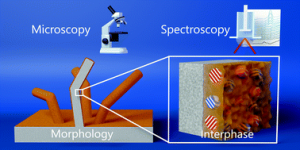
November 2, 2021
Rechargeable lithium-metal (Li-metal) batteries offer an opportunity to improve on the energy storage density of current lithium-ion batteries and meet the demand of new markets, such as long-range EVs or electric planes. However, they face major performance hurdles related to safety and quickly declining performance. Researchers at the Department of Energy’s Lawrence Berkeley National...
Read more

October 8, 2021
Earlier this summer, Energy Secretary Jennifer M. Granholm launched the U.S. Department of Energy’s (DOE’s) Energy Earthshots Initiative, and the first Energy Earthshot is the “Hydrogen Shot,” with the goal of accelerating development and deployment of clean hydrogen across sectors. DOE’s Lawrence Berkeley National Laboratory (Berkeley Lab) plays a leading role in the research and...
Read more
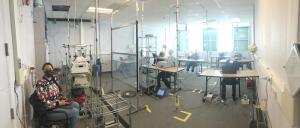
September 23, 2021
Having good room ventilation to dilute and disperse indoor air pollutants has long been recognized, and with the COVID-19 pandemic its importance has become all the more heightened. But new experiments by indoor air researchers at Lawrence Berkeley National Laboratory (Berkeley Lab) show that certain circumstances will result in poor mixing of room air, meaning airborne contaminants may not be...
Read more

September 1, 2021
Science innovators are invited to apply for the two-year fellowship program hosted at Cyclotron Road, an opportunity to advance hard technologies that have the potential for broad societal impact from concept to viable first product. Cyclotron Road is a division of the Department of Energy’s Lawrence Berkeley National Laboratory (Berkeley Lab). The fellowship program is run in partnership with...
Read more
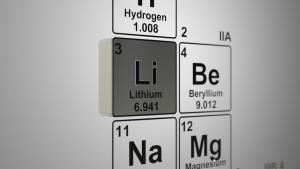
September 1, 2021
Researchers at the Department of Energy’s Lawrence Berkeley National Laboratory (Berkeley Lab), in collaboration with their partners in the US and Germany, envision a future of safe, high-performance rechargeable lithium-metal (Li-metal) batteries in a recent publication by Nature Reviews. Today’s rechargeable lithium-ion (Li-ion) batteries —the type commonly found in electric vehicles,...
Read more

August 17, 2021
The journal Spectrochimica Acta Part B: Atomic Spectroscopy dedicated its May issue to Rick Russo, a former senior scientist at Lawrence Berkeley National Laboratory (Berkeley Lab) and founder of the Laser Technologies Group, in honor of his 70th birthday. Russo is one of the most influential scientists in the field of laser ablation spectroscopy and the recipient of a Berkeley Lab Prize Lifetime...
Read more
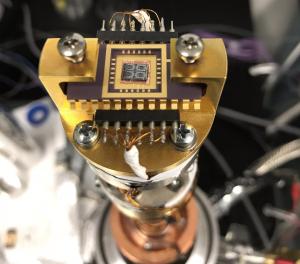
August 16, 2021
With a $2-million grant from the California Energy Commission (CEC), Berkeley Lab has developed a cost-effective thermoelectric waste-heat recovery system to reduce electricity-related carbon emissions. Industries such as the glass, cement, power, and steel sectors expel a huge amount of high-temperature waste heat. Converting this waste heat cost effectively to electricity can provide a...
Read more
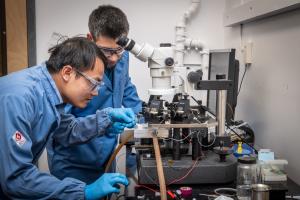
August 16, 2021
With rising interest in backup power, storage of solar energy, and electric vehicles, the race is on to improve the performance of rechargeable lithium batteries. A Berkeley Lab team has developed an easy, fast, and inexpensive method to measure battery performance. Led by Ravi Prasher and Sean Lubner of the Energy Technologies Area, the new technique uses thermal waves to measure local lithium...
Read more

July 30, 2021
All seventeen U.S. national laboratories and many prominent publishers, journals, and other organizations in scientific publishing announced today the beginning of a partnership to support name change requests from researchers on past published papers. Lawrence Berkeley National Laboratory (Berkeley Lab) is coordinating the effort. This agreement will allow researchers who wish to change their...
Read more

July 12, 2021
Bryan McCloskey, professor in UC Berkeley College of Chemistry and a chemical faculty engineer affiliated with the Energy Storage and Distributed Resources Division at Berkeley Lab, has been awarded the 2021 Tajima Prize. The honor from the International Society of Electrochemistry (ISE) recognizes McCloskey’s outstanding contributions to electrochemistry on the basis of his published work....
Read more
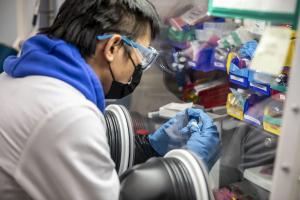
June 23, 2021
In our future electrified world, the demand for battery storage is projected to be enormous, reaching to upwards of 2 to 10 terawatt-hours (TWh) of annual battery production by 2030, from less than 0.5 TWh today. However, concerns are growing as to whether key raw materials will be adequate to meet this future demand. The lithium-ion battery – the dominant technology for the foreseeable future...
Read more
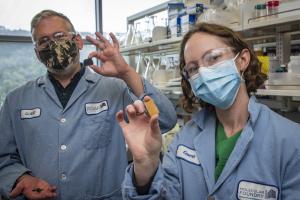
June 14, 2021
A multidisciplinary Berkeley Lab team has been working for several years to develop a game-changing plastic that, unlike traditional plastics, can be recycled indefinitely and is not made from petroleum. Their latest milestone was the release of an analysis showing the feasibility and potential outcomes of launching the unique material, called poly(diketoenamine) or PDK, into the market at an...
Read more

June 7, 2021
This month 11 scientists and engineers (pictured) will join the prestigious two-year fellowship program at Cyclotron Road based at the Department of Energy’s Lawrence Berkeley National Laboratory (Berkeley Lab) and UC Berkeley. Selected from a record pool of 300 applicants, the 11 individuals will make up Cohort 2021 of Cyclotron Road. As part of their two-year fellowship they will work to bring...
Read more

April 16, 2021
A Q&A with Berkeley Lab researcher Hanna Breunig on technoeconomic analysis, and how she uses it to make negative emissions technologies more competitive For new energy technologies, the time elapsed from when a breakthrough is made in a laboratory setting until when it is validated, scaled up, piloted, and then widely commercialized can be years or even decades. But in the race to avoid the...
Read more
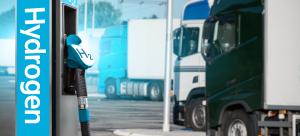
April 16, 2021
Interest in hydrogen fuel cells as a sustainable source of clean energy is on the rise globally, and hydrogen fuel cells are widely seen as a viable, zero-emission option to power trucks, trains, ferries, and passenger vehicles. The heavy-duty vehicle (HDV) market could prove to be ideal for fuel cell development and deployment. Hydrogen fuel cells are well-suited for this market because of their...
Read more

April 5, 2021
Leaders profiled in Department of Energy feature The future of energy depends on our ability to store it reliably, cheaply, and safely — whether to power electric vehicles, our buildings and factories, or to contribute to the clean grid of the future. Researchers at Lawrence Berkeley National Laboratory (Berkeley Lab) -- including three lead scientists recently profiled by the Department of...
Read more
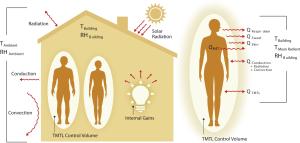
January 26, 2021
Heating and cooling buildings is a large part of global energy demand and a significant source of CO2 and greenhouse gas emissions, and in the coming decades the energy demand for heating and cooling - also known as thermal energy - is expected to grow considerably. Scientists and engineers have made many advances in lowering building energy demand by improving energy efficiency in building...
Read more
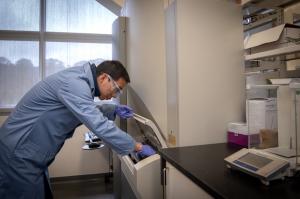
January 14, 2021
One of the aspects of lithium-ion batteries least understood by scientists has now been elucidated by a new research approach, opening the door to major improvements in battery performance, according to a new study by Berkeley Lab scientists. Their study, recently published in the journal Joule, used a technique developed by Berkeley Lab battery scientists in the Energy Technologies Area to...
Read more

January 7, 2021
Researchers from the Massachusetts Institute of Technology (MIT), Stanford University and Lawrence Berkeley National Laboratory (Berkeley Lab) — including Ravi Prasher — collaborated to write an article on energy, which was recently awarded the best peer-reviewed article for general readers by the American Energy Society. Prasher, associate laboratory director of the Energy Technologies Area...
Read more